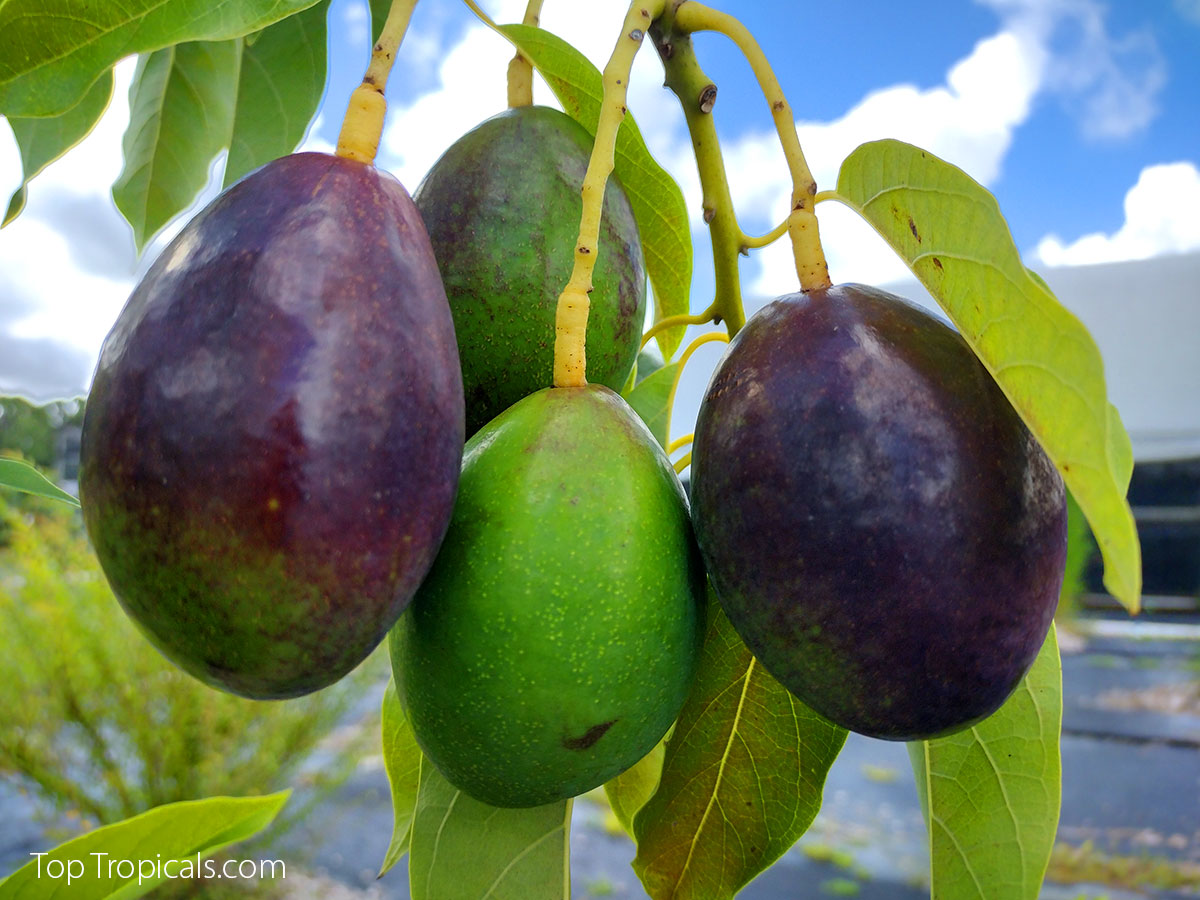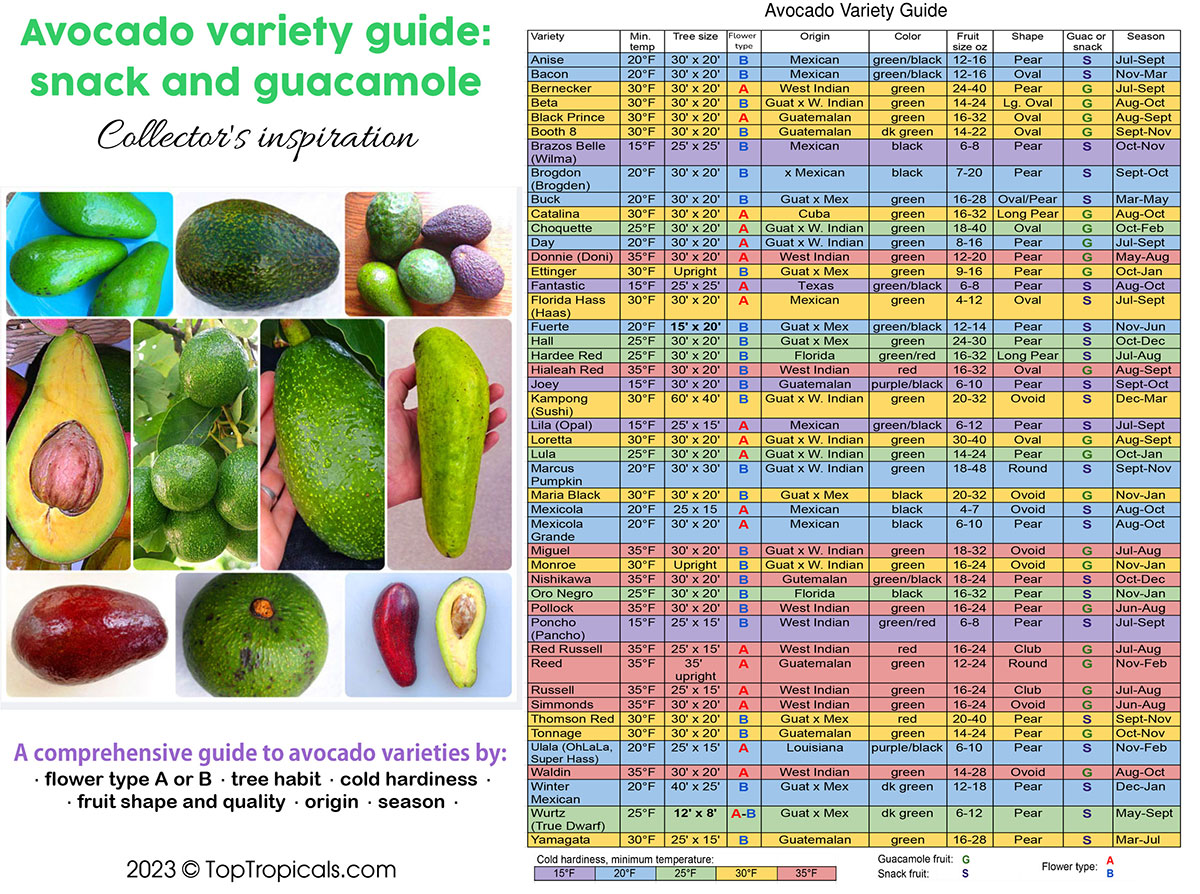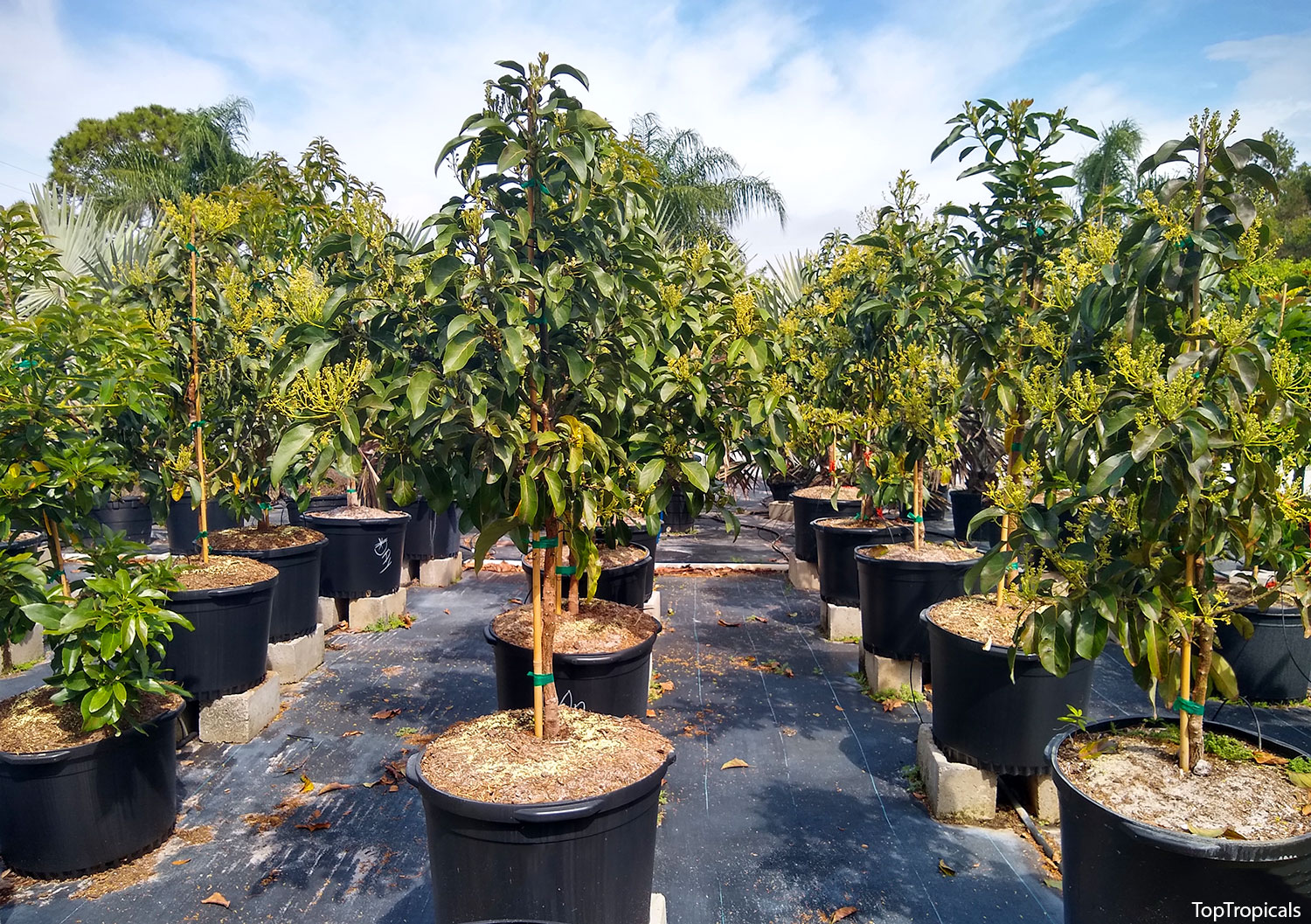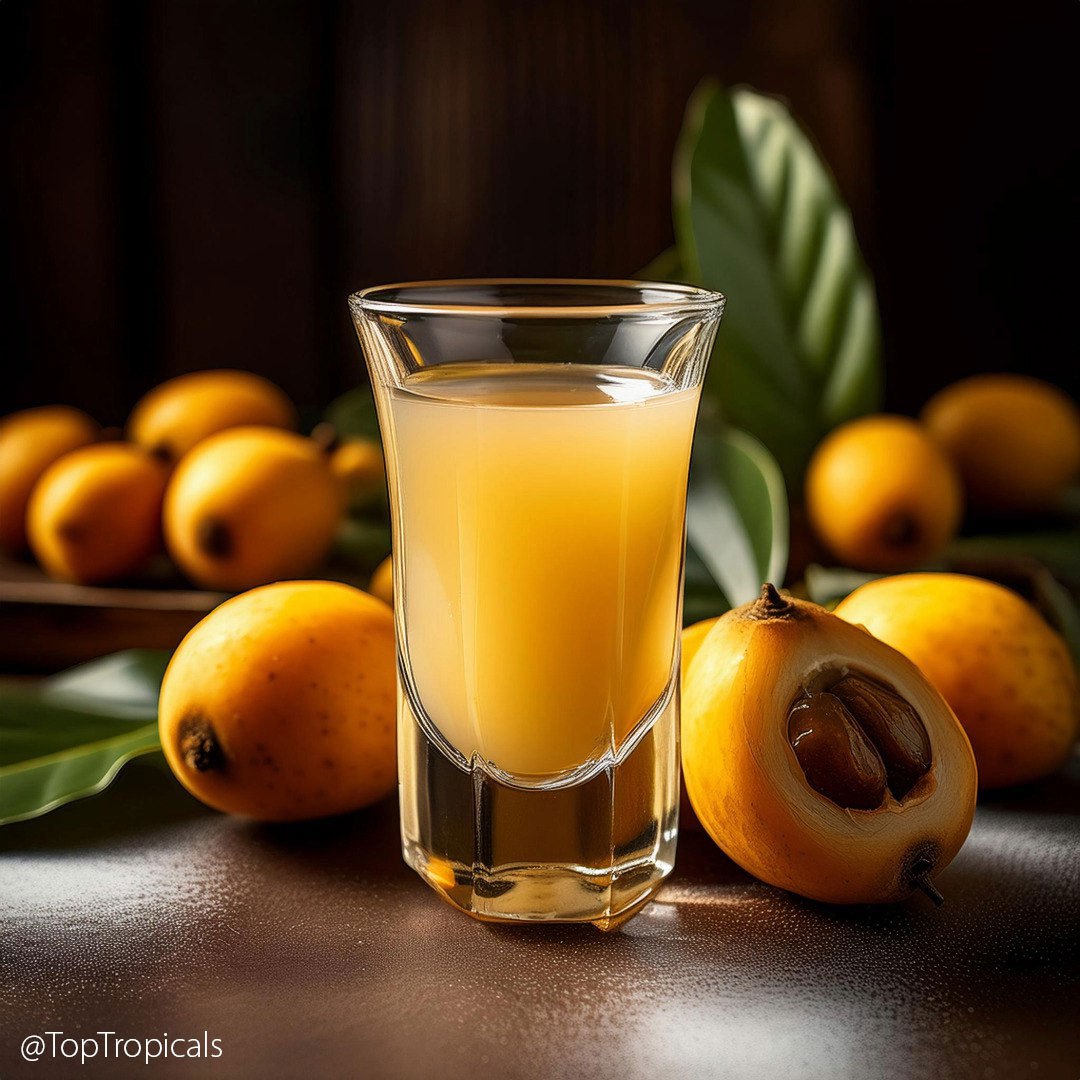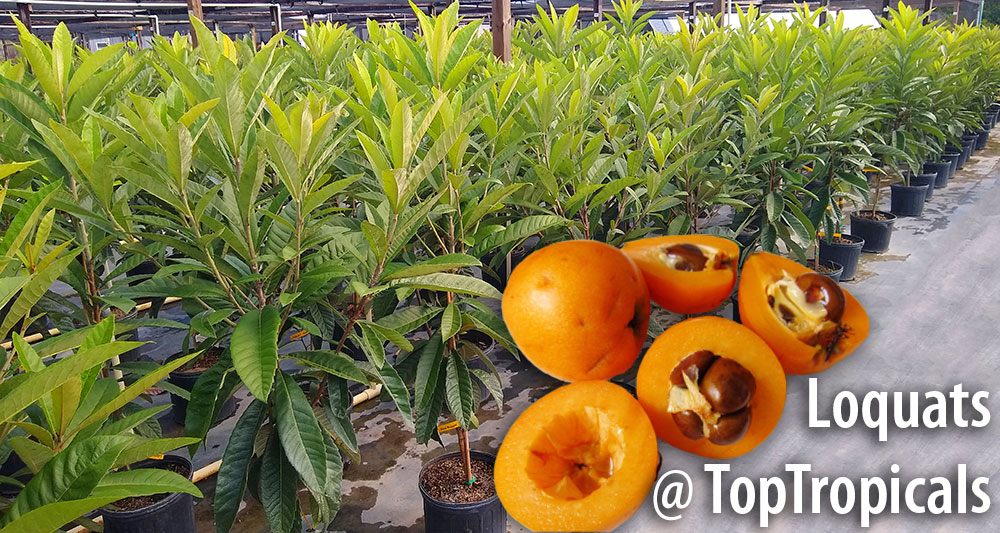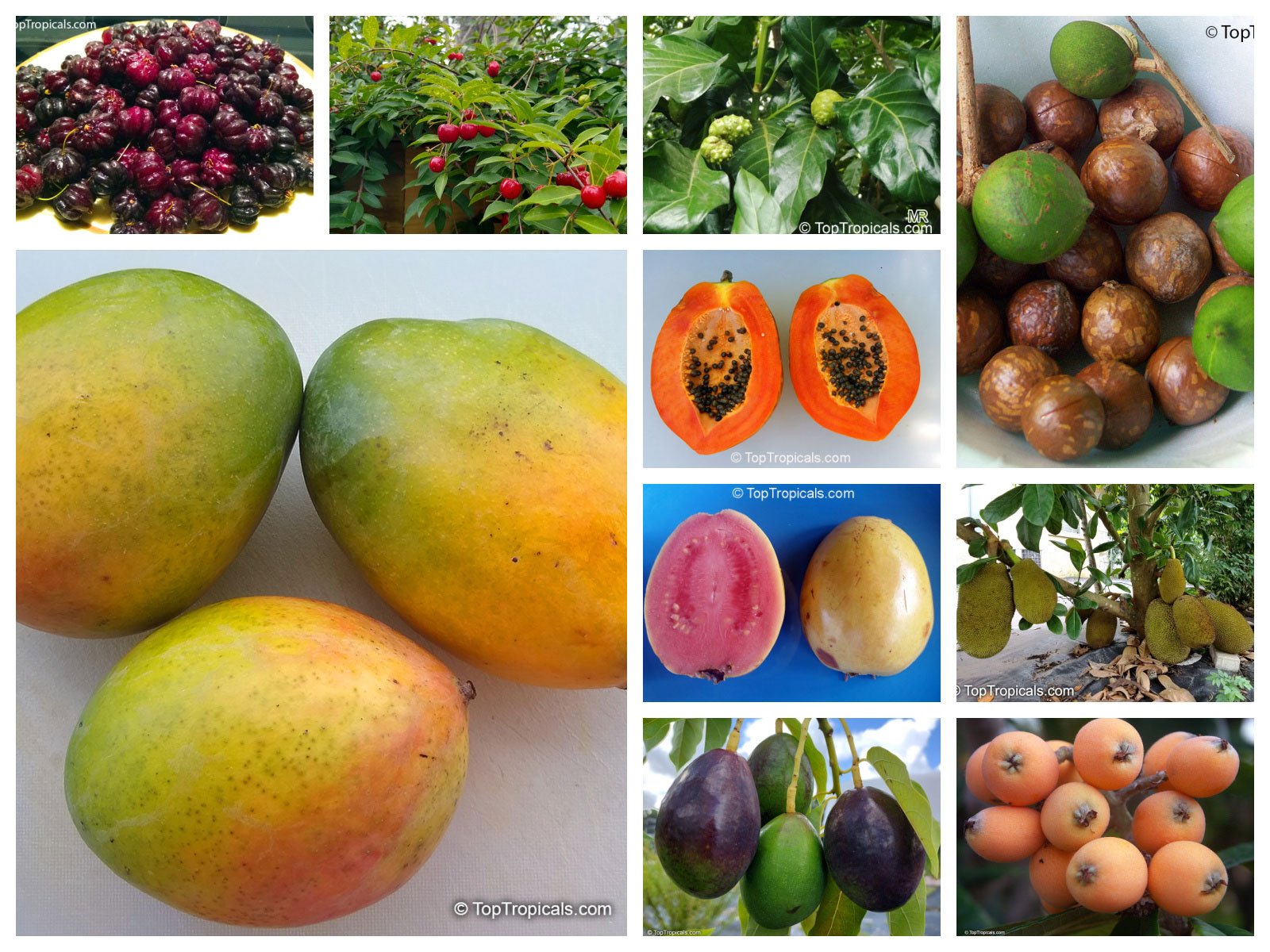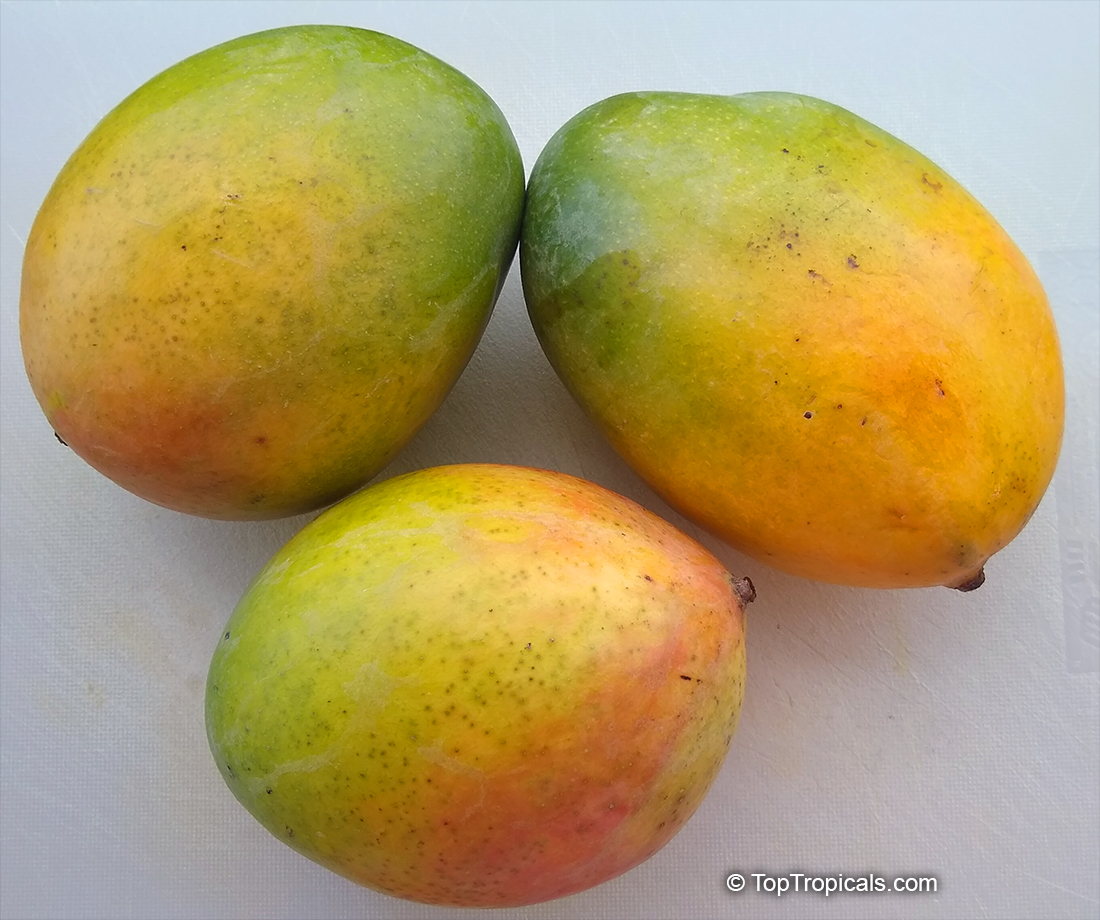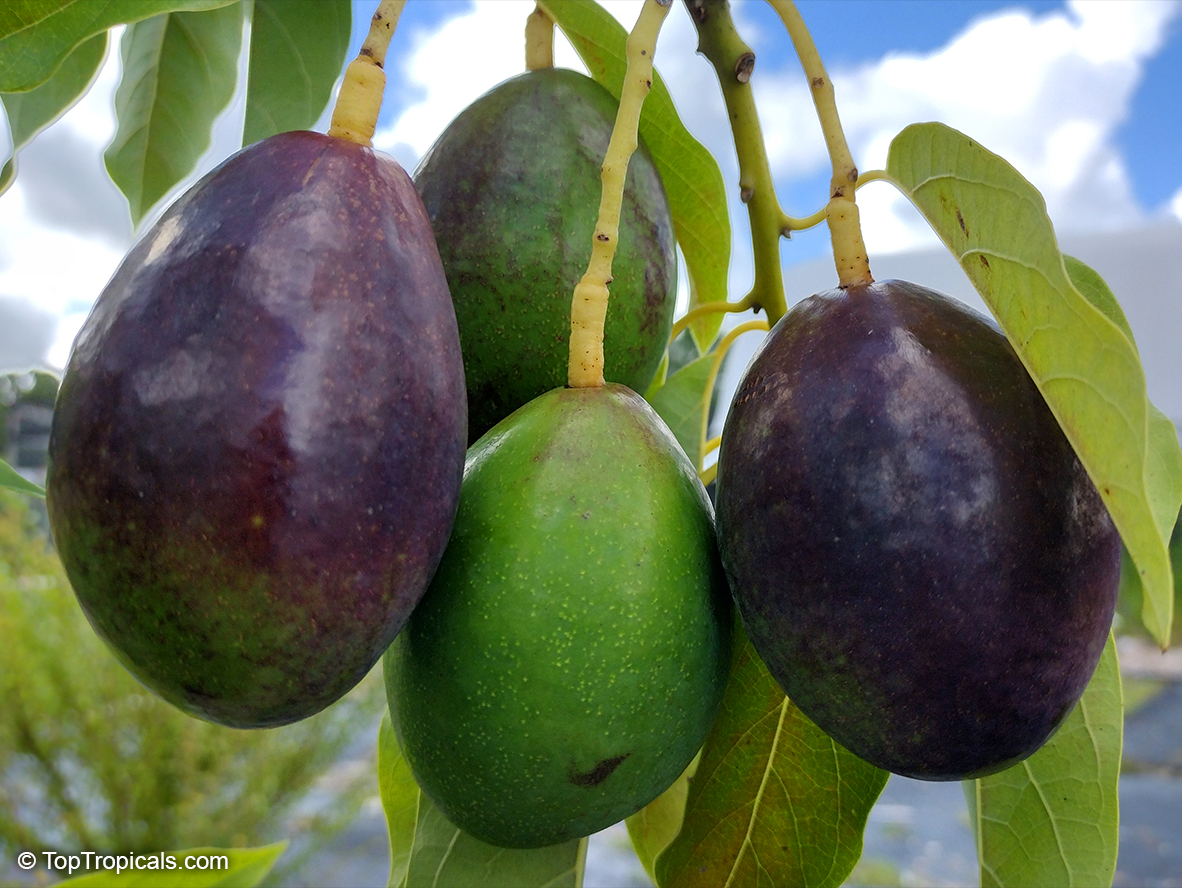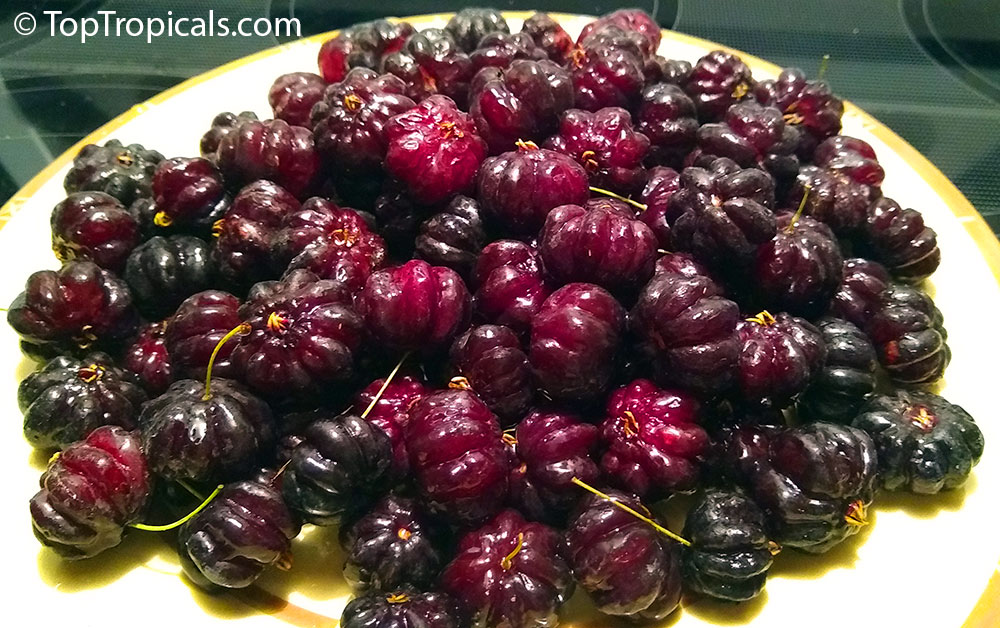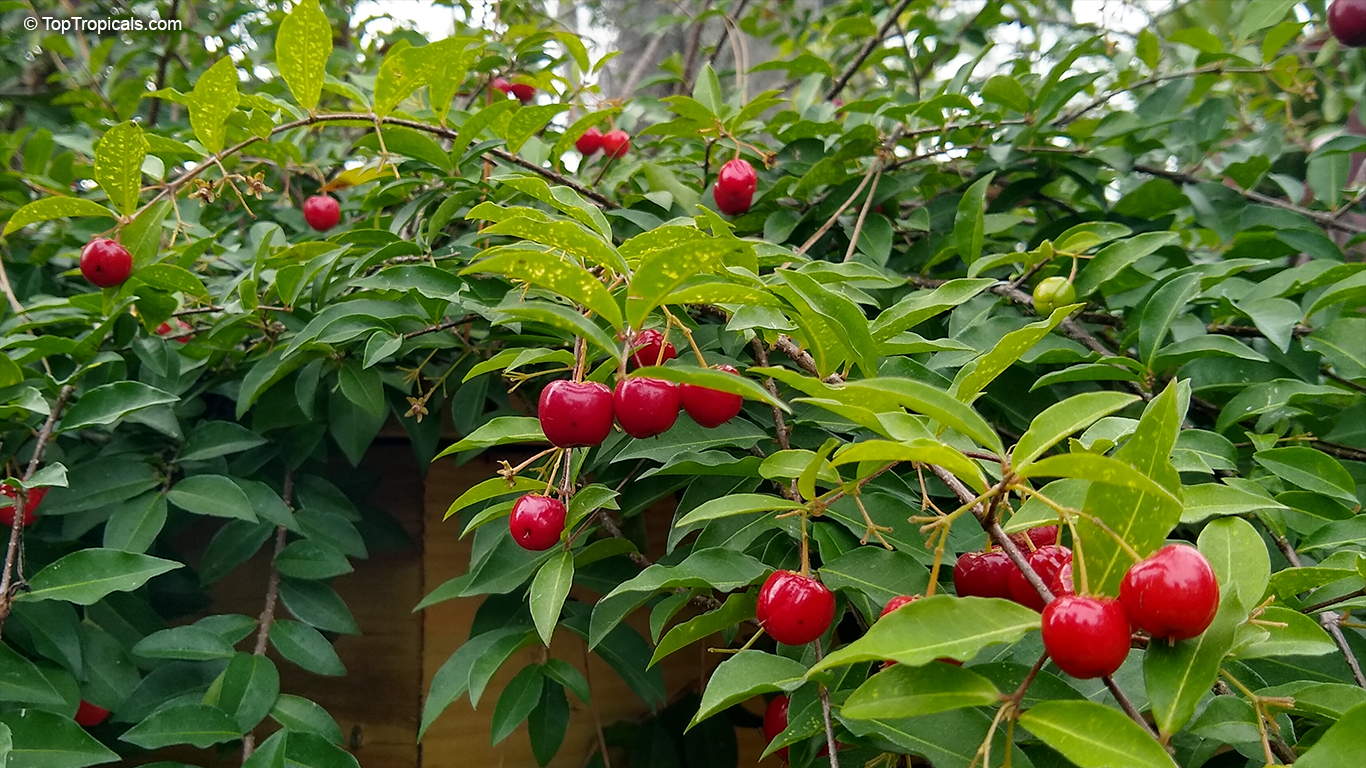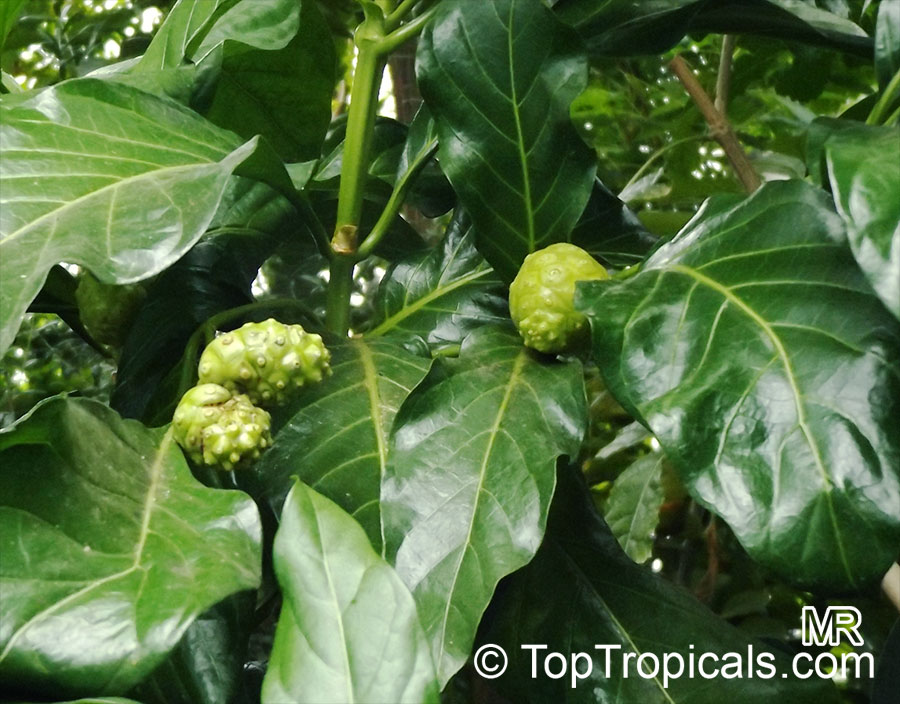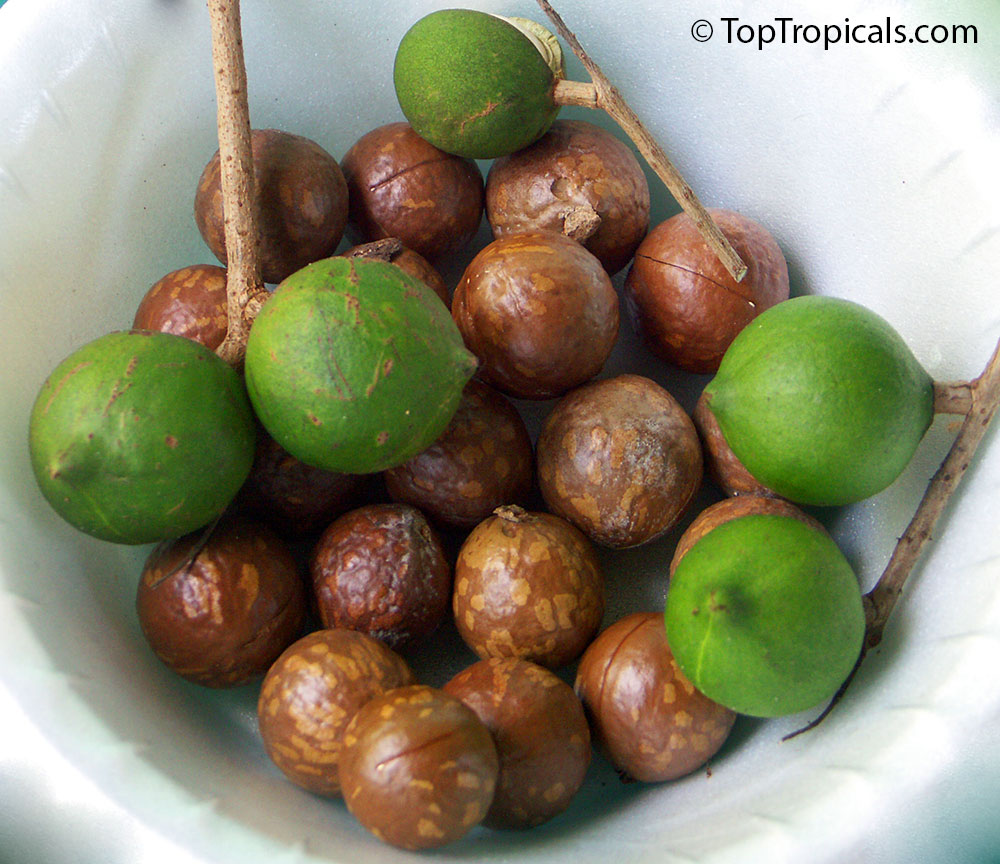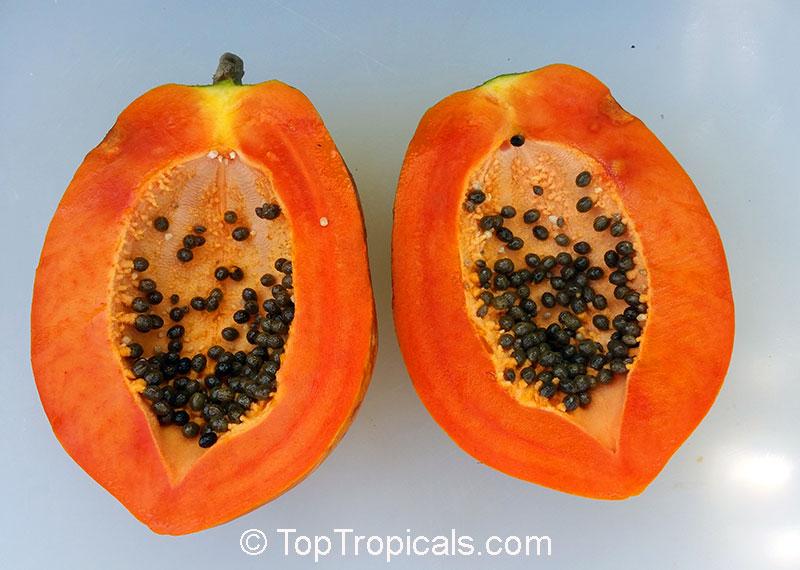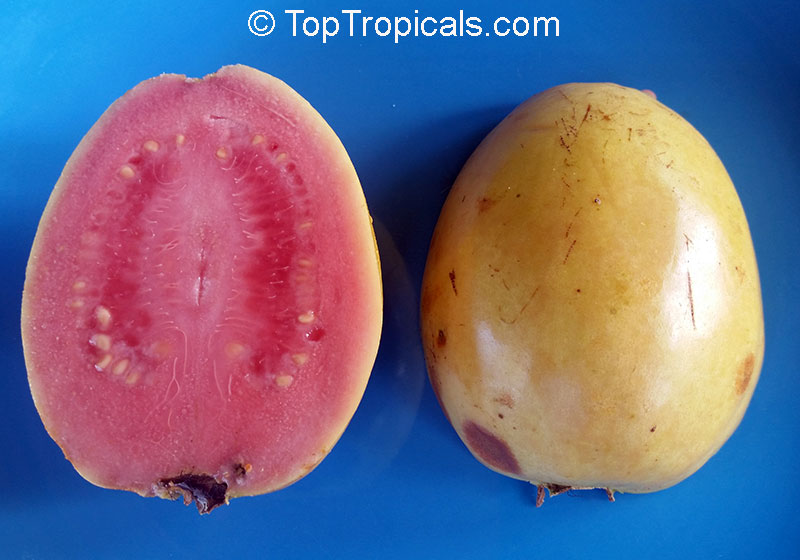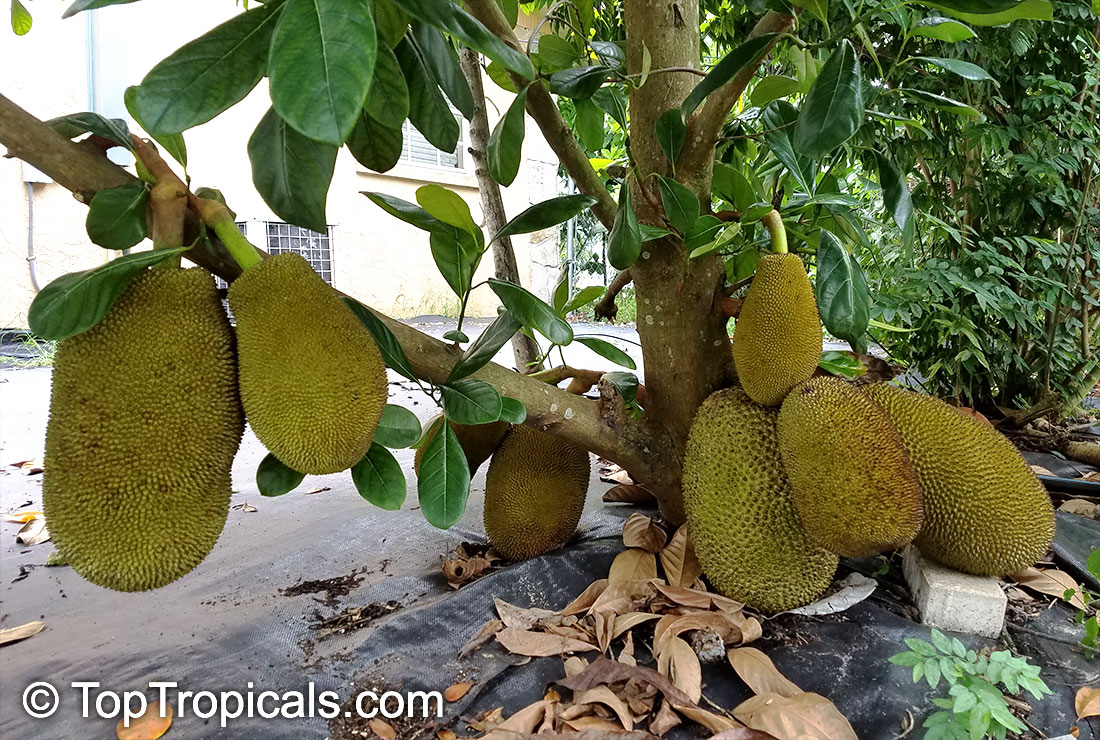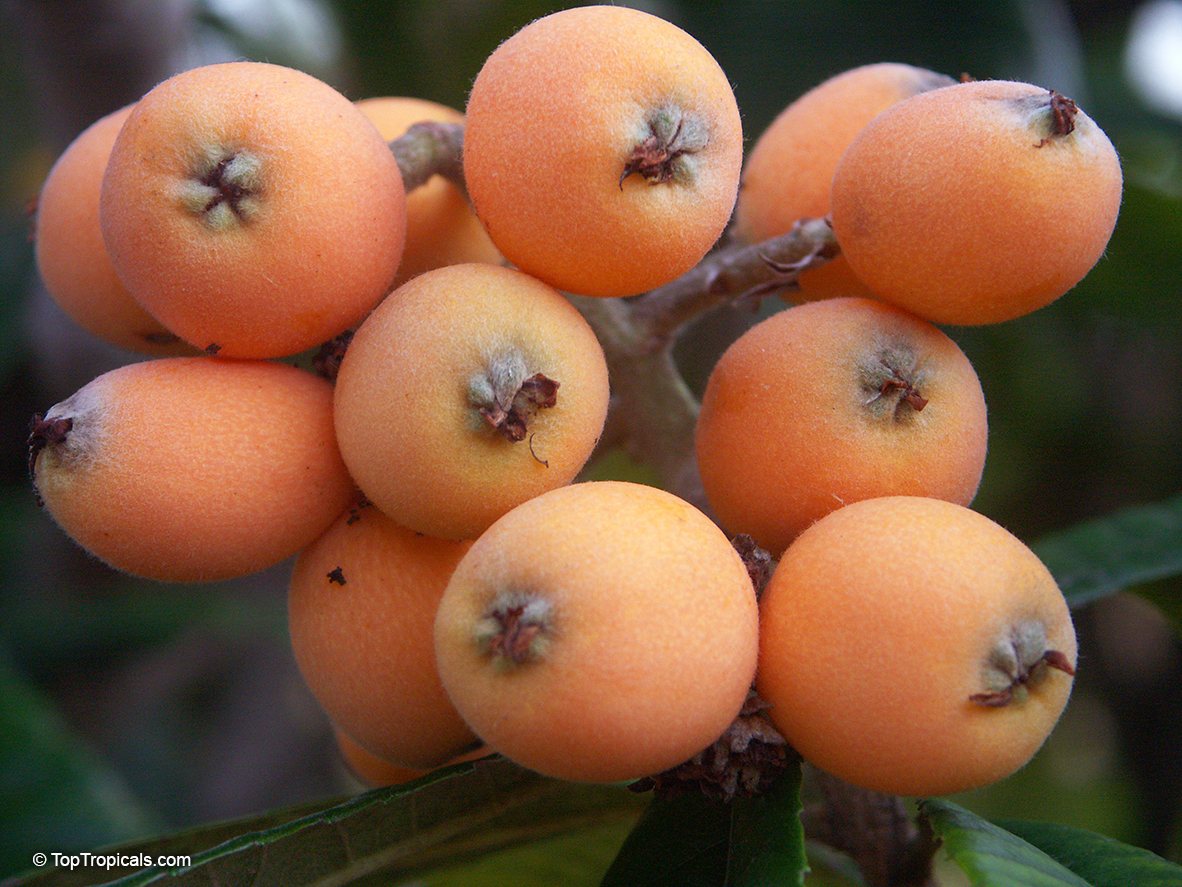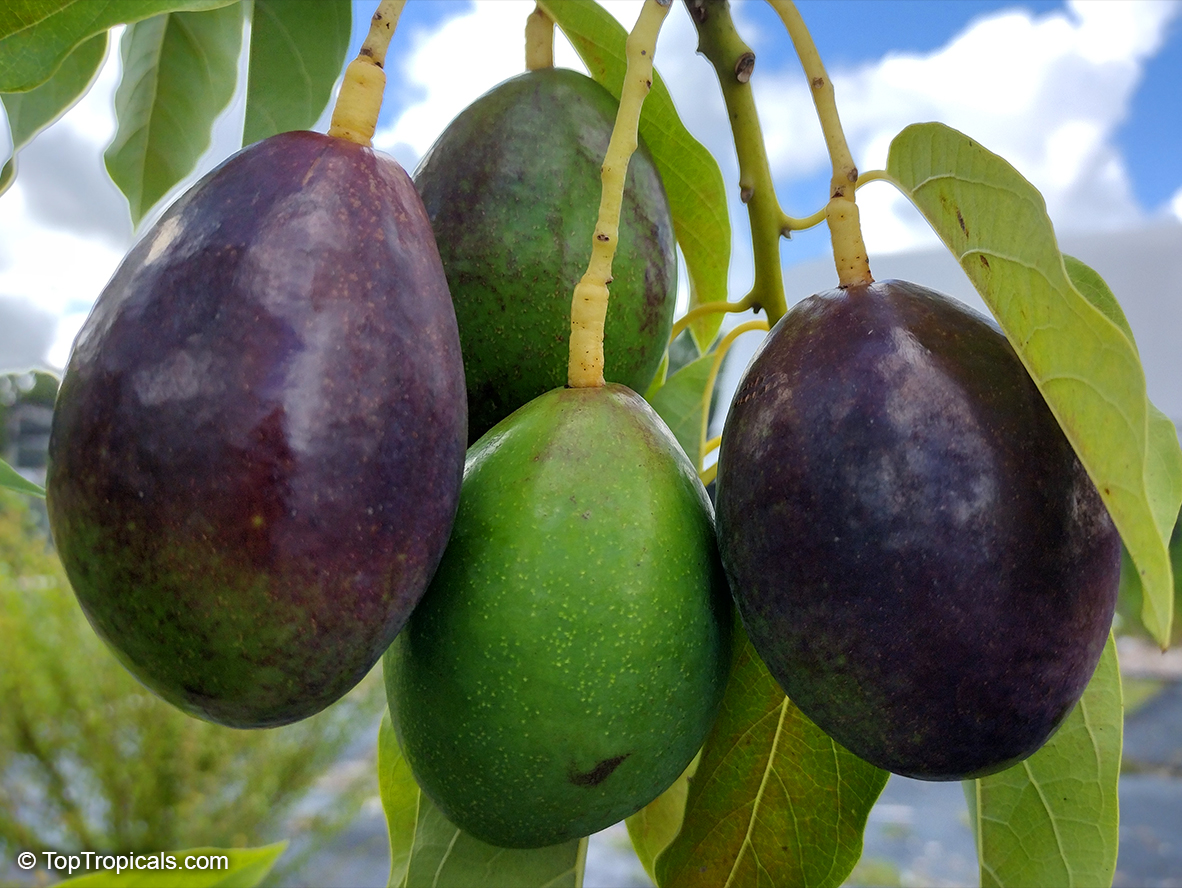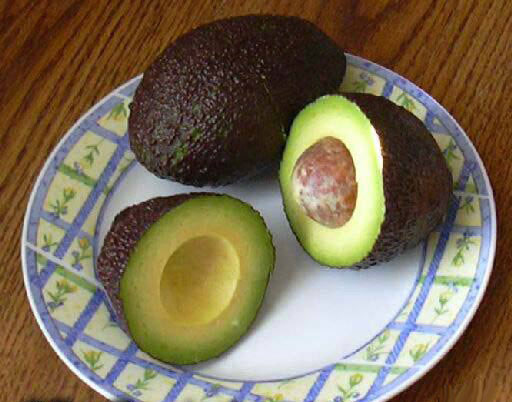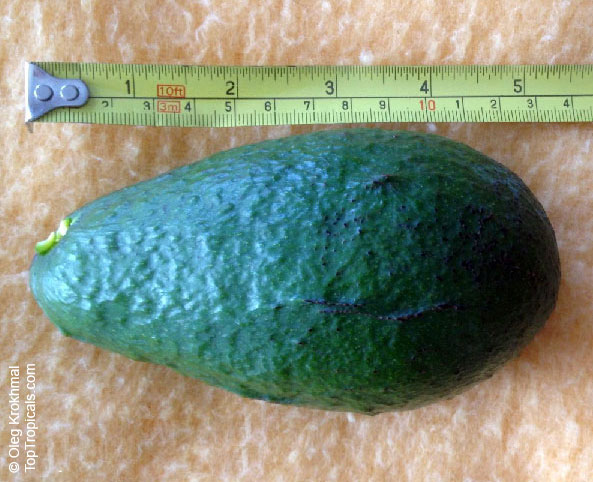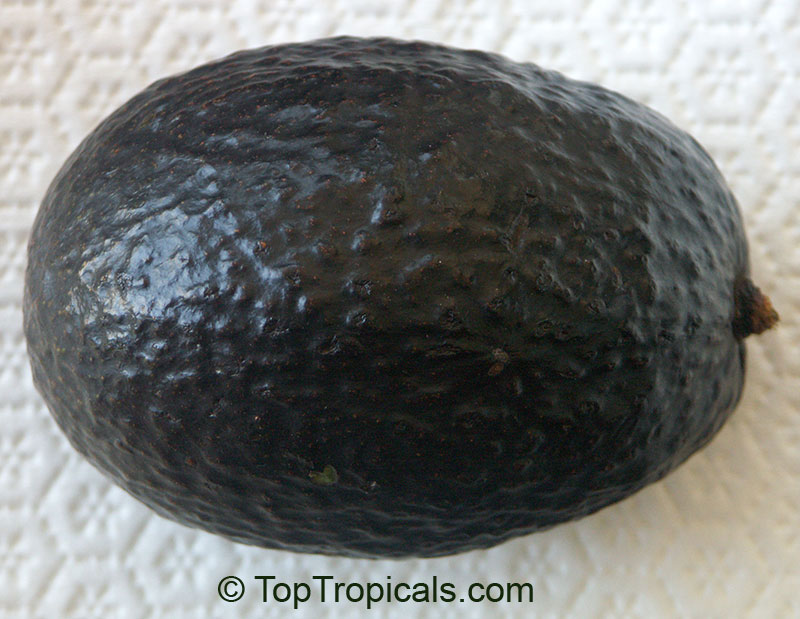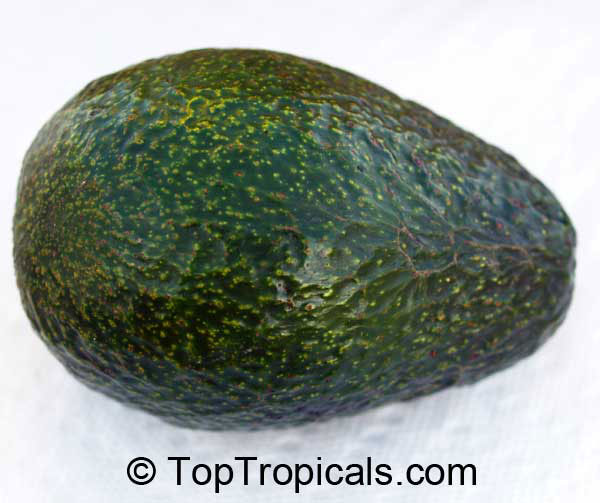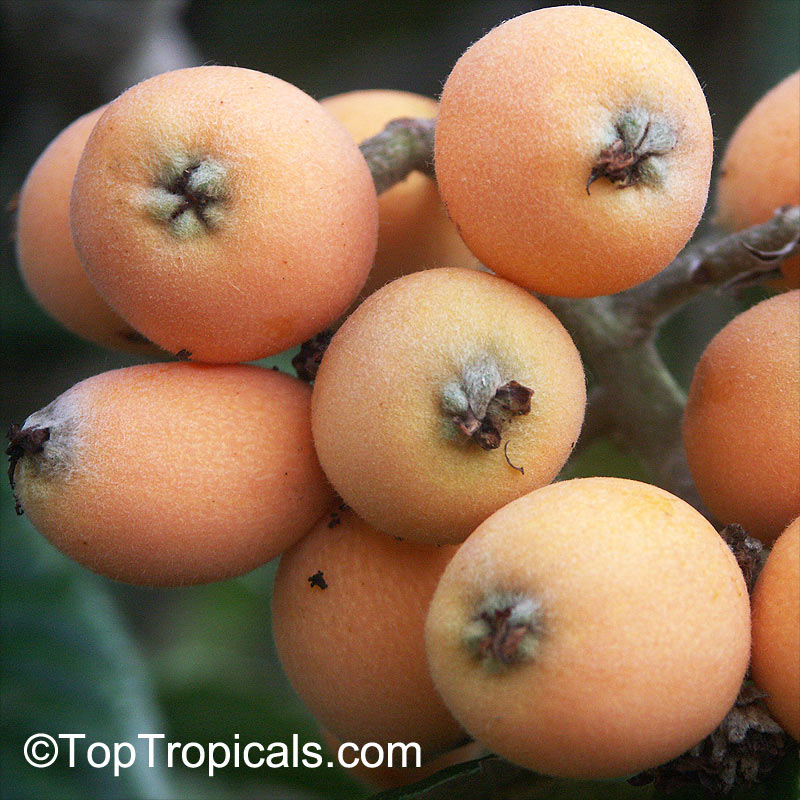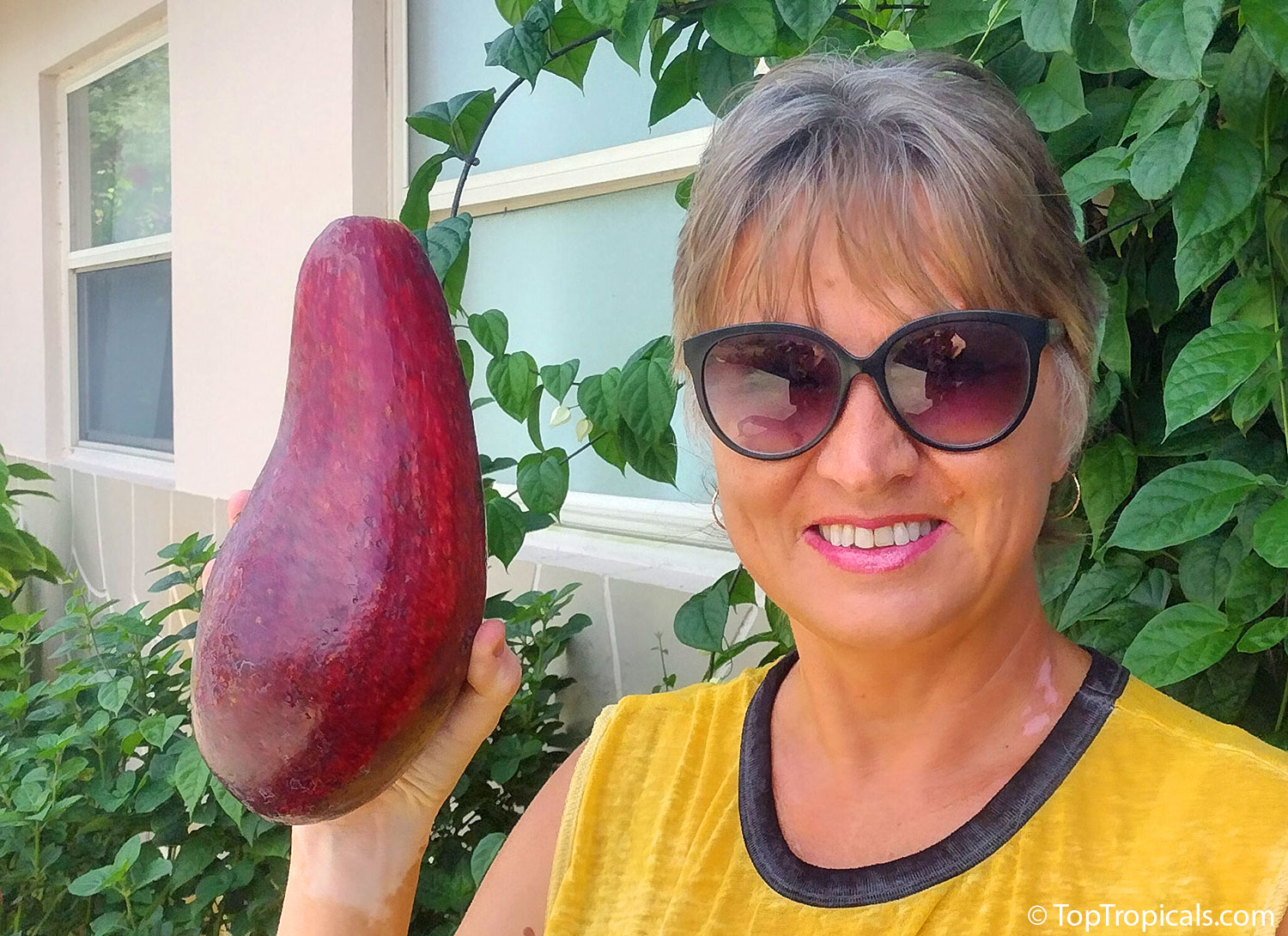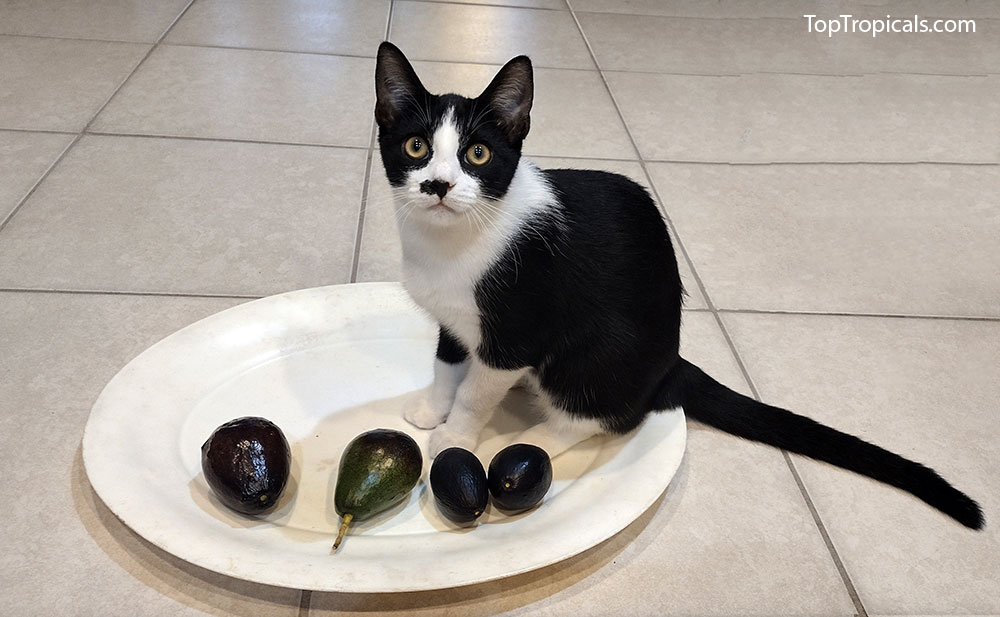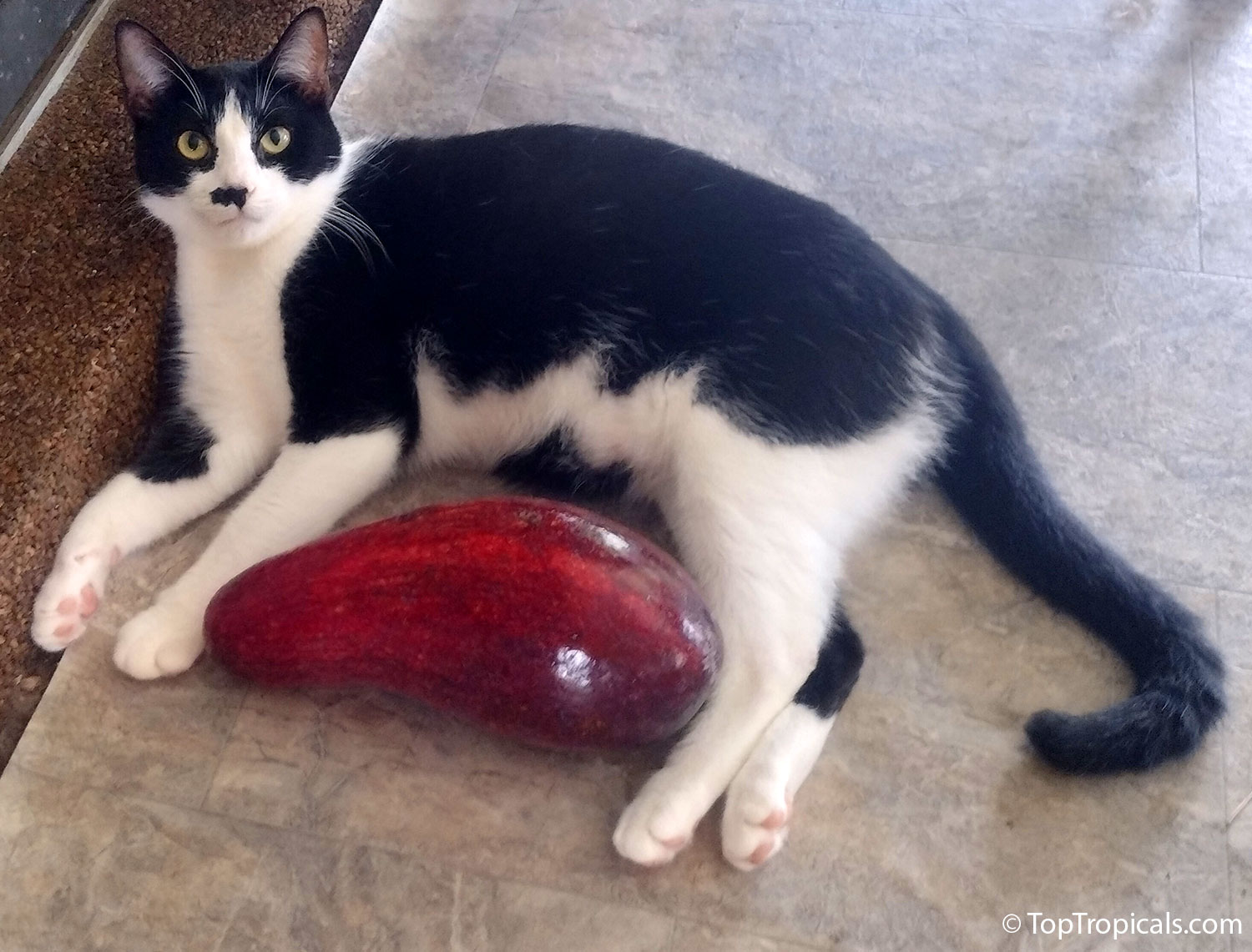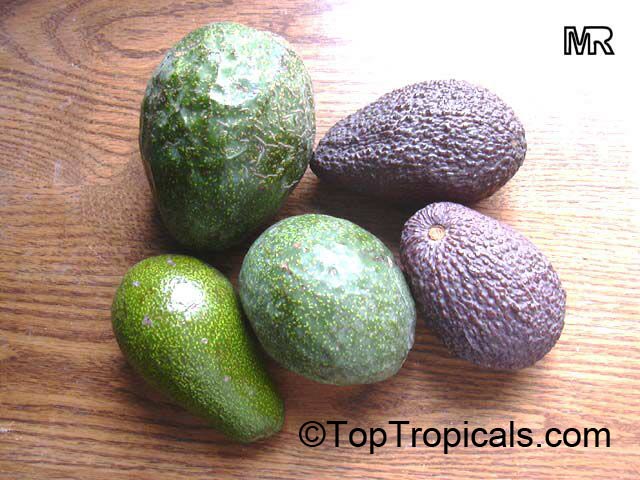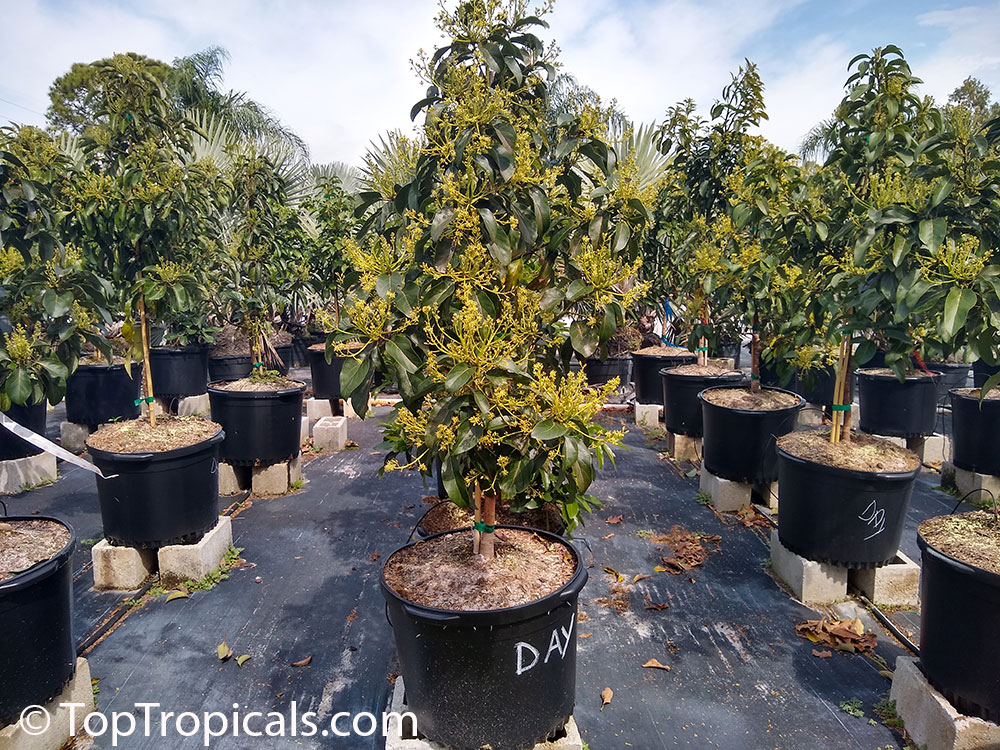Garden Blog - Top Tropicals
Date:
Avocado pollinating and crops
Photo above: Avocado Joey - very buttery fruit, cold hardy variety.
Q: I bought an anise leaf-scented avocado from you, and it is finally quite large and doing great. I live in California, the coldest temperatures we seem to get in some winters is around 25 to 28F, and it never lasts long. The tree might get a bit of frost nipping on the new growth, but it has done very well. It has flowered profusely for the last two years but hasn't set any fruit. What variety you might recommend to help with pollinating?
A: We are glad your avocado is doing great. Anise is one of our favorite varieties, with the wonderful smell of leaves and tasty fruit.
Cold hardiness and flower quality
It is true that cold damage may affect avocado production, especially in setting fruit. To improve the tree's cold hardiness, make sure to provide balanced plant food, especially during the season of active growth. For our avocado trees, we use Sunshine C-Cibus year-round.
If you prefer to use dry (granulated, slow-release) fertilizers, make sure they contain micronutrients, or apply Sunshine Superfood microelement complex once a month.
To improve flower quality (including the ability to set fruit), we recommend a special micronutrient supplement called Sunshine Honey. It contains Boron and Molybdenum - elements that are responsible for setting fruit and for developing fruit (meaning not dropping at the early stage of development).
Cross-pollination and crop
In general, every avocado tree is self-fertile, meaning it can produce some fruit with its own pollen and doesn't necessarily require a second tree for pollination. So even if you don't do anything, sooner or later your tree will set fruit. However, it is also true that the amount of fruit and crop reliability depends on pollination factors. One type of avocado classification is by flowering and pollination behavior - type A or B.
When both types of trees are grown in proximity to each other, their overlapping flowering patterns significantly enhance the chances of cross-pollination. This can lead to improved fruit set and higher yield, making it especially important for commercial production and, to a lesser extent, for home growers.
Therefore, it's advisable to plant different varieties of avocado in your garden - the more, the merrier! The greater the diversity of avocado trees with overlapping flowering periods, the better your crop is likely to be. If you're growing an avocado tree without other avocados nearby, it becomes helpful to have more than one tree with different flowering patterns (A and B) to increase yield in your garden.
Anise Avocado is type B. So to increase your crop, you may consider planting type A variety from the list: Bernecker, Black Prince, Catalina, Choquette, Day, Donnie, Fantastic, Florida Hass, Lila, Loretta, Lula, Mexicola, Mexicola Grande, Red Russell, Reed, Russell, Simmonds, Ulala , Waldin .
To learn more about avocado types, fruit characteristics, cold hardiness and much more, refer to our Avocado Variety Guide - a page with very convenient interactive chart allowing you to quickly sort types of avocado by requirements of your choice (just click on column header to sort data). You may also buy a Book or download a PDF.
Photo above: 15 gal Avocado trees for local pick up. Delivery and installation available!
When you are in the mood for something special - you need a Loquat Liquor
🍑 Loquat tree is an excellent choice for any garden, as it is quite cold hardy, drought-, poor soil- and salt tolerant. The delicious fruit look and taste similar to apricots, but there is only one problem: there are too many of them! Make Loquat the perfect fruit for an easy home winery...
🍹 Loquat Liquor recipe
Wash loquat fruit and slit in 4-5 places. You may leave seeds in for Apricot-nutty flavor similar to Amaretto. Combine fruit with vodka and sugar in a wide mouth jar and cover. Stir fruit once a day until sugar is dissolved. Then stir once a week for 4 weeks. Drain liquid and strain through fine cheesecloth. Enjoy!
You can dispose the used fruit but we usually give it a second life: add water, bring to boil, let sit, chill, and it will make another (almost non-alcoholic) drink!
✔️ 3 quarts of loquat fruit- ✔️ 1 quart vodka
- ✔️ 3 cups sugar
- ✔️ vanilla to taste (optional)
📚 From previous posts:
🎥 YouTube video about Loquat
📁 Overlooked fruit: tasty Loquat recipes (PDF)
🛒 Shop Loquat varieties
#Recipes #Food_Forest #Loquat
🔴 Join 👉 TopTropicals
Date:
Grow your own food:
How hardy is a Loquat tree?
Q: I am looking for a fruit tree for my backyard that is low maintenance, fast fruiting, and can take some cold (I live in Orlando FL and we do get occasional frost in winter). I like the taste of Loquat fruit, it reminds me of apricots. How cold hardy is this tree?
A: Loquat tree is a very good choice for Florida gardens. It can
take both cold and heat and produces lots of tasty fruit right away. Last
winter when we had a record freeze in our area with a couple of nights around
25F, the only trees that didn't get any damage at all were Loquats and
Macadamias, and those were still young, newly planted 4 ft trees.
To learn more about Loquat trees, check out this
">video and article: Golden Loquat - the symbol of Prosperity.
Date:
Discover 10
best fruit trees to grow
in Florida and Southern landscapes
Q: We recently moved into our new home in Florida, and the property is a great size - 5 acres - but it currently has no trees, just a few palms. I'm looking to plant some productive fruit trees to start building our own Food Forest. What fruit trees would you recommend as a good starting point?
A: With five acres of space, you have a fantastic opportunity to create a fruitful garden that can provide for your family for many years to come. Below are our top recommendations for must-have, easy-to-grow fruit trees that thrive in Florida's climate, grow quickly, and start producing right away.
1. Mango Tree
Mango trees (Mangifera indica) are a must-have for any Florida garden, embodying the essence of the Sunshine State with their delicious and nutritious fruit packed with vitamins and fiber. These fast-growing, low-maintenance trees thrive with minimal water and are heat-tolerant. Grafted varieties produce high-quality, fiberless fruit in just 2-3 years, while dwarf "condo" mangoes are perfect for smaller spaces or containers. While young trees need frost protection, mature trees handle cold better. Grafted mangoes offer rich taste that you won't find in commercially grown, fibrous varieties, ensuring a sweet and vibrant harvest from your own garden.
2. Avocado Tree
The Avocado tree (Persea americana) is an essential addition to any tropical or subtropical garden. Known for its health benefits and superfood status, it's a favorite fruit that's not only productive but also a beautiful ornamental tree. Some avocado varieties are more cold-tolerant than mango trees, with the ability to survive temperatures below 25F. While many enjoy growing avocado from seed, only grafted trees guarantee quality fruit and immediate production, as seedlings can take 7-8 years to bear fruit. To successfully grow avocado, ensure good drainage by planting on a raised mound (4-6 inches) and keep the soil consistently moist. There are also compact varieties like Wurtz and Fuerte that thrive in containers or small spaces, making them ideal for patios and small gardens.
3. Tropical Cherries
Tropical cherries, such as Cherry of the Rio Grande (Eugenia aggregata), Grumichama (Eugenia brazilensis), Pitomba (Eugenia luschnathiana), and Black Surinam Cherry (Eugenia uniflora var. Lolita), are popular and easy-to-grow fruit trees that offer fast growth and excellent fruit production. These compact, versatile trees thrive in both the ground and containers, starting to produce fruit almost immediately. Eugenias are low-maintenance, requiring minimal water, thriving in various soil types, and being pest-free. They are heat-tolerant and can endure cool winters, surviving light frosts. Birds love the fruit, but don't worry - there will always be plenty for everyone.
4. Barbados Cherry Tree
Barbados Cherry (Malpighia glabra), also known as Acerola, is a tropical cherry renowned for having the highest vitamin C content of any fruit. This nutrient-packed fruit is perfect for jellies, jams, and freezing without losing its vitamin C. The Barbados Cherry is a fast-growing, dense shrub that fruits multiple times a year, providing abundant harvests for gardeners seeking quick results. It thrives in alkaline soil, tolerates drought, and is relatively cold-hardy, withstanding light freezes. Birds love the fruit, making it a great addition to wildlife-friendly gardens. The dwarf variety, Nana, with its small leaves and fruit, is perfect for containers, borders, or even bonsai, adding ornamental value to any space.
5. Noni Tree
The Noni Tree (Morinda citrifolia) is a top superfood plant that makes a fantastic addition to any Southern garden. Known for its numerous medicinal benefits, Noni fruit offers anti-inflammatory properties, relief from arthritis, and support for conditions like diabetes, metabolism, and weight loss. It's even believed to help fight cancer. Noni trees grow quickly and begin producing fruit within 2 years from seed. This tough, resilient plant thrives in poor soil, endures summer heat, and withstands drought conditions. Despite its tropical appearance, Noni is surprisingly cold-hardy, recovering well after leaf damage in cooler weather. In addition to its health benefits, the Noni tree has ornamental value, with large, waxy leaves and unique fruit, where the flower appears to grow directly on the fruit!
6. Macadamia Nut Tree
The Macadamia Nut Tree (Macadamia integrifolia) is a fantastic addition to any garden, allowing you to grow these delicious, high price tag, nutrient-rich nuts right at home. These trees are cold-hardy, grow quickly, and thrive in all Florida soil types. Once established, they are productive and can tolerate both flooding and drought. Older trees can survive colder winters, while young trees need protection from temperatures below 25-26F. Macadamia trees like plenty of water and a special fertilizer program, including liquid fertilizers and microelements, to ensure healthy root development and optimal production. Aside from being rich in healthy fats, vitamins, and minerals, macadamia nuts offer numerous health benefits, such as improved digestion, heart health, weight management, and blood sugar control. They are also packed with tocotrienols - antioxidants which may protect against cancer and brain diseases.
7. Papaya Tree
Papaya trees (Carica papaya) are resilient, easy to grow, and produce fruit year-round. Rich in papain, a digestive enzyme, papayas are a superfood that promotes gut health. These fast-growing trees often begin producing fruit within the same year they're planted, providing quick rewards for gardeners. Many varieties, especially dwarf papayas, are space-efficient, reaching only 6-8 feet tall while still yielding large crops, making them perfect for small gardens. Surprisingly hardy for a tropical plant, papayas can withstand light freezes and strong winds (tested in hurricanes!). While they are self-fertile, planting 2-3 different cultivars improves pollination and increases yields. "Solo" cultivars, with their smaller, round or oval fruits, are sweet and less susceptible to fruit flies.
8. Guava Tree
Guava trees are beloved for their flavorful fruit, commonly used in juices, drinks, and desserts. Popular varieties include Tropical Guava (Psidium guajava), Cattley Guava (Psidium littorale), Cas Guava (Psidium friedrichsthalianum), and Pineapple Guava (Feijoa sellowiana). Despite their tropical nature, guavas are surprisingly cold-hardy, suitable for cooler climates and occasional frost. These trees thrive in moist conditions and can tolerate some flooding, while their compact growth makes them easy to maintain at any height or shape. Guavas are fast-fruiting, often producing fruit within a year of planting, and even some varieties in 1 gal containers. The dwarf Nana variety is perfect for container culture, producing full-sized fruit in a compact form. Guava trees are mostly pest-resistant, though mealybugs may require occasional treatment with neem oil in humid, rainy areas. Planting multiple guava trees ensures a continuous supply of fresh, juicy fruit and delicious guava juice for everyone to enjoy.
9. Jackfruit Tree
The Jackfruit tree (Artocarpus heterophyllus) is a striking, fast-growing tree known for producing the largest fruit grown on a tree, making it a showstopper in any garden. Nutrient-packed and often used as a meat substitute in South Asian cuisine, Jackfruit is also delicious in curries, chutneys, and as dehydrated chips. These trees grow quickly, have large waxy leaves, and can be maintained at a compact height of 7-8 feet, making them ideal for smaller spaces and easier cold protection. Despite being a tropical species, Jackfruit trees are relatively cold-tolerant and can survive light frost (although on the account of production volume), with established trees being more hardy than seedlings. Jackfruit trees begin producing fruit within 3-4 years from seed, and varieties come true to seed, eliminating the need for grafting, though it can be done for specific varieties.
10. Loquat Tree
The Loquat tree (Eriobotrya japonica) is a fast-growing, drought-tolerant, and highly cold-hardy tropical fruit tree that thrives in Florida gardens. Loquats are heavy producers, with juicy, aromatic fruit that ripens from early spring to early summer, offering a delicious apricot-like flavor. This compact tree is perfect for small gardens, beginners, and those with limited space. Loquats are undemanding, thriving in any soil and withstanding summer heat, winter cold, heavy rains, and occasional flooding. Nutrient-rich, they are high in sugar, acids, vitamins B and C, minerals, and pectin. Loquats are versatile, enjoyed fresh or used in fruit salads, jams, jellies, chutneys, pies, sauces, and even wine-making, and they are often used as a natural sweetener.
Date:
Five most popular Avocado varieties
Food Forest
"What is the best variety of Avocado?"
"Do you have the one with small black fruit and bumpy skin?"
"I have avocado with very large green fruit, what variety is it?"
These are frequently asked questions we get from our customers. This basic "classification" by black/green doesn't encompass all the wonderful qualities avocados have to offer. There are numerous hybrids in cultivation, and once you plant your first tree and taste the REAL fruit (not from the grocery store), you'll be eager to explore other varieties. While it's true that avocado fruit can vary in "butter" content, most superior varieties are equally delicious. First comes first -
The most popular Avocado varieties this year are:
1. Brogdon - red-purple pear-shaped fruit, 7-15 oz. Skin is very thin, yellow buttery flesh. Fruit ripens in late summer-fall. Very cold hardy.
2. Hass - probably the most popular, but this tree prefers drier climate (Florida is humid, so we plant adaptable Florida Hass here). The fruit is dark-colored with a rough and bumpy skin, turns black when ripe.
3. Fuerte - a dwarf and a very cold hardy variety. Everybody's favorite "Condo Avocado": perfect for container culture and small yards. The mature tree in the ground is under 15 ft; 6-7 ft in containers.
4. Oro Negro - Oro Negro means "black gold" in Spanish, which is an incredibly appropriate name for this fruit. This Monroe hybrid (with big size fruit) is crossed with a Mexican type which would explain the black skin. The flesh is rich and buttery with a creamy texture.
5. Winter Mexican - one of most cold hardy varieties, Guatemalan x Mexican origin. Mature trees may withstand temperatures in the mid 20s. Oblong fruit, 12-18 oz, thick green skin. Very vigorous tree, bears heavily and regularly in December-January.
Learn more: Avocado Variety Guide - check this out for interactive chart of Avocado varieties and sort them by flower type A or B, tree habit, fruit shape and quality, cold hardiness, origin, season and more!
Photo above: Avocado Hass
Photo above: Avocado Fuerte
Photo above: Avocado Oro-Negro
Photo above: Avocado Winter-Mexican
What tropical fruit tree is cold hardy and easy to grow? Its Golden Loquat the Symbol of Prosperity, and it tastes like
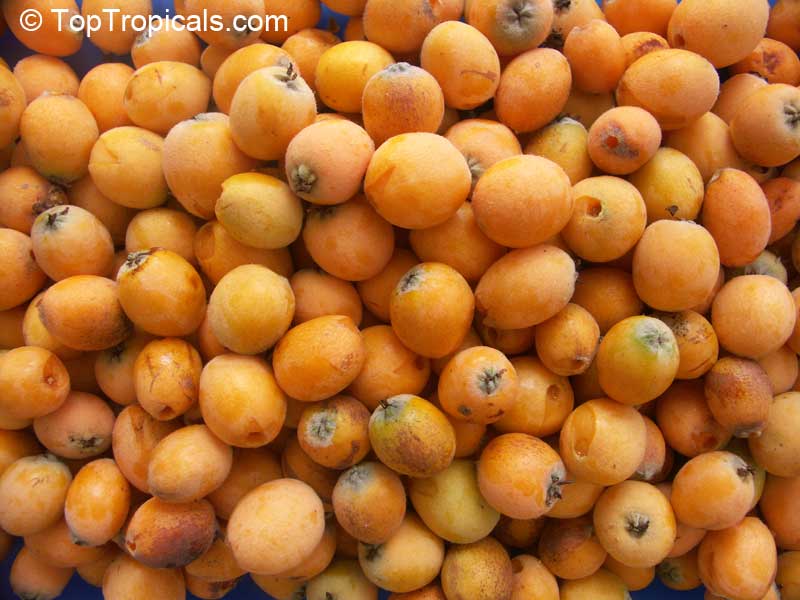
Loquat (Eriobotrya japonica) fruit
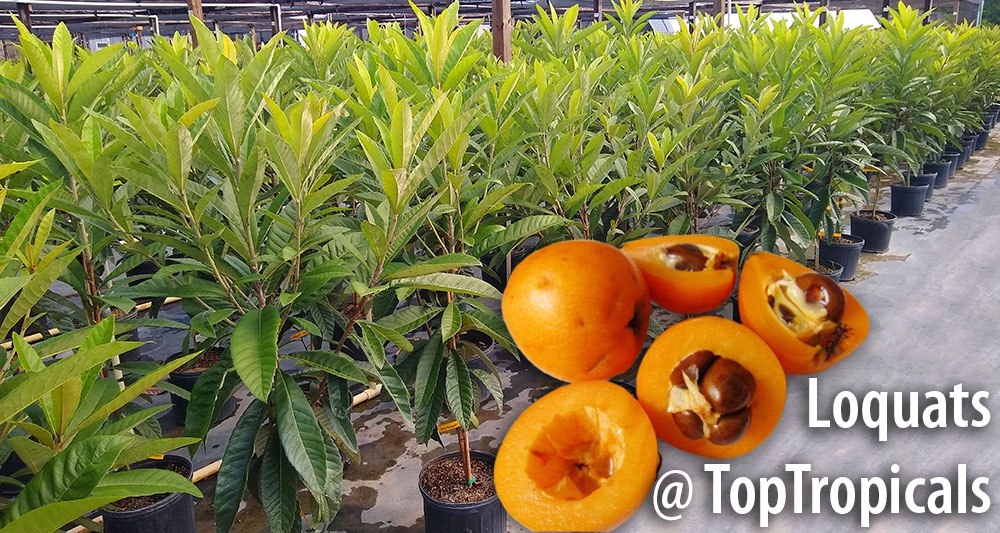
Loquat (Eriobotrya japonica) trees in pots
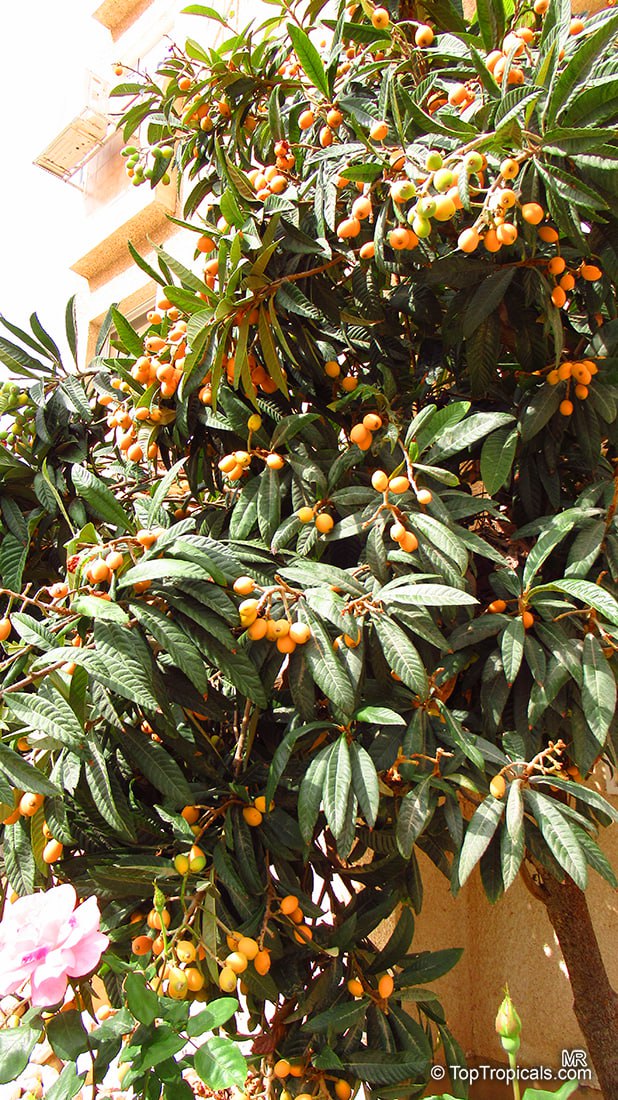
Loquat (Eriobotrya japonica) tree
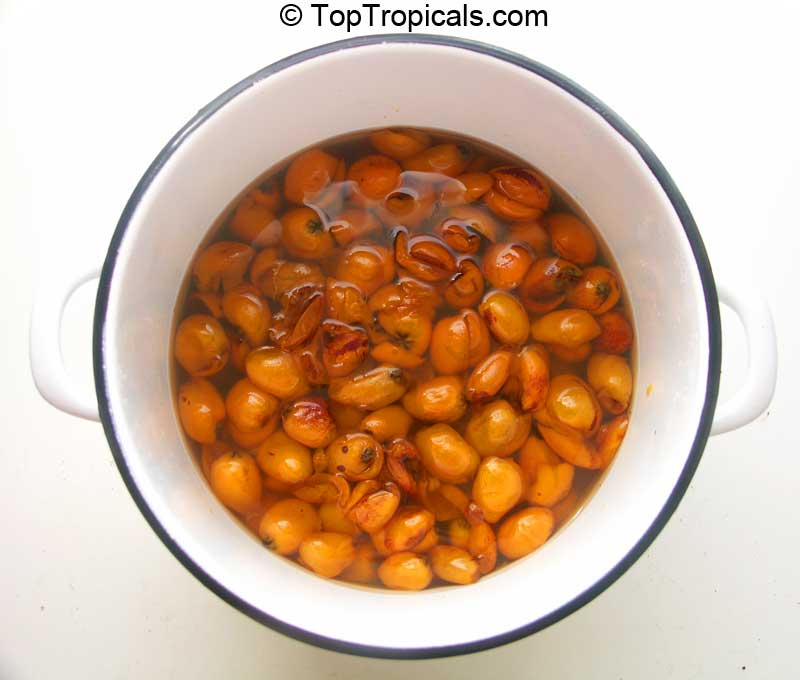
Loquat (Eriobotrya japonica) compot
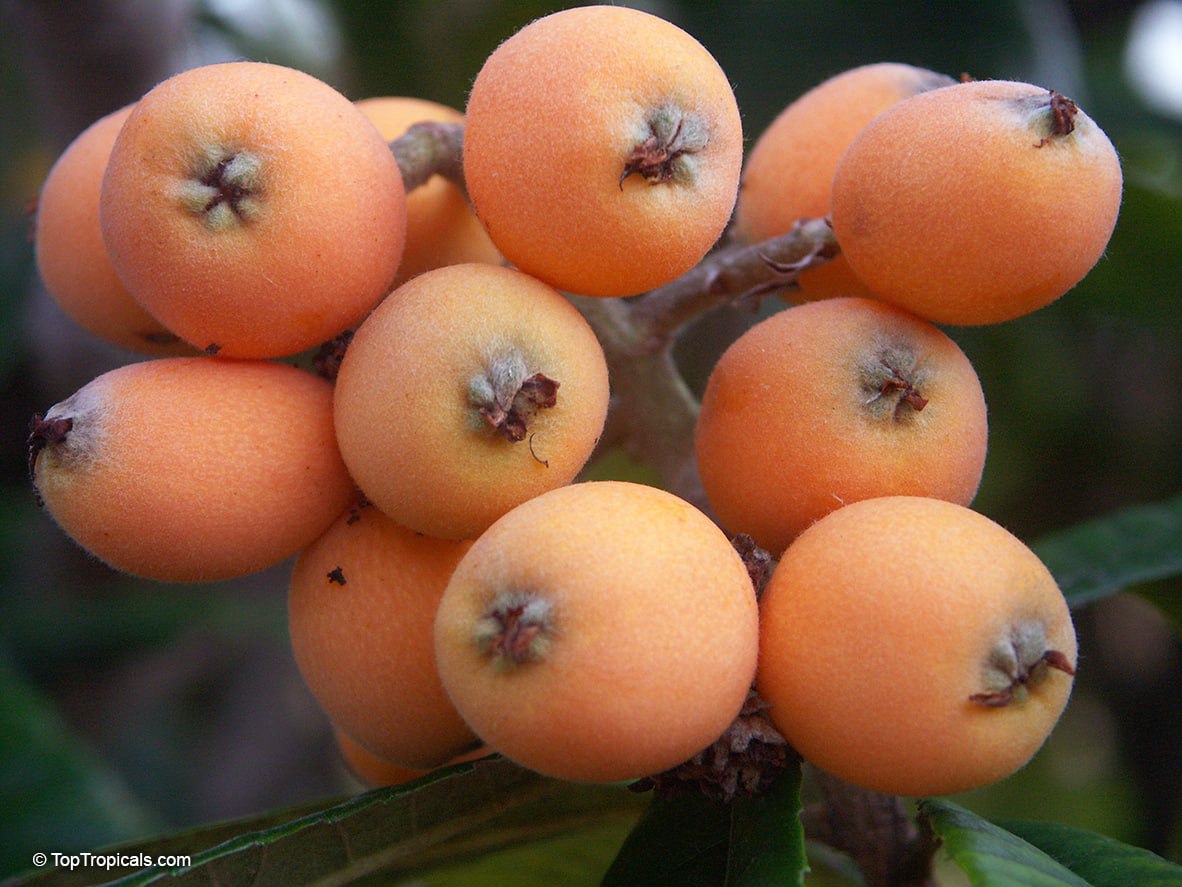
Loquat (Eriobotrya japonica) fruit
- 🍑 Loquat tree (Eriobotrya japonica) is fast-growing, drought-tolerant, cold-tolerant, compact tropical fruit tree.
- 🍑 Heavy producer. Fruits are juicy, aromatic, and resemble apricots. Ripen from early Spring to early Summer.
- 🍑 Ideal for small gardens, beginner fruit tree growers.
- 🍑 High in sugar, acids, vitamins B and C, minerals, and pectin.
- 🍑 Eaten fresh, used in fruit salads, jams, jellies, chutneys, pies, tarts, and wine
- 🍑 Grown in Japan for over 1,000 years. In China, represents gold and wealth, often included in auspicious displays or offerings for prosperity💰
Popular as a natural sweetener and for creating sauces.
📚 Learn more about Loquats
'>🎥 YouTube video about Loquat
📁 Overlooked fruit: tasty Loquat recipes (PDF)
🛒Start your fruit garden with Loquats
#Food_Forest #Recipes
🏵 TopTropicals
Date:
Golden Loquat - the symbol of Prosperity
by Alex Butova, the Witch of Herbs and Cats
...The Loquat is a wonderful tree, ideally suited to small gardens
thanks to its compact growth habit. The plant is very fast growing, drought
tolarant, and cold-tolerant to mild frost. It is an ideal fruit tree for the
beginner...
...The flavor is a mixture of peach, citrus and a mild mango...
...In China, the Loquat because of its golden color, represents gold and wealth. It is often one in a bowl or composite of fruits and
vegetables to represent auspicious wishes or the "Five Prosperities" or
wurui...
CONTINUE READING >>
Chinese believe that planting a Golden Loquat Tree will bring you prosperity and wealth. Growing a Loquat is like growing your own Money tree!
Date:
Avocado Variety Guide: Snack or Guacamole?
Collector's inspiration
Photo above: It's NOT an egg plant! It's a Red Russell :)
A comprehensive guide to Avocado varieties by: flower type A or B, tree habit, fruit shape and quality, cold hardiness, origin, season and more!
Many gardeners who are eager to purchase their first avocado tree often wonder which variety to choose. Most people are familiar with two primary classifications commonly found in grocery stores: Small & Black or Large & Green.
Frequently, we hear customers ask, "Do you have the one I like, the smaller fruit with bumpy skin? Not that big, tasteless, and watery one!" What they may not realize is that this basic (but practical!) classification doesn't encompass all the wonderful qualities avocados have to offer. There are numerous hybrids in cultivation, and once you plant your first tree and taste the REAL fruit (not from the grocery store), you'll be eager to explore other varieties. It's a guarantee! While it's true that avocado fruit can vary in "butter" content and how "watery" or "buttery" it is, most superior varieties are equally delicious. Or perhaps we should say they are so versatile and distinct in taste that you'll start building your collection of these trees, much like fruit enthusiasts do with mango varieties.
Every garden has unique requirements based on climate, temperature, and property size. These factors must be considered before planning your avocado garden. Additionally, many gardeners may wonder about Type A vs. Type B classifications and whether they need more than one tree to yield fruit. You'll find all this valuable information in our Avocado Variety Guide.
Basic classifications of avocados
1) By flowering pattern and pollination behavior: Type A and Type B
2) By origin: Mexican, Guatemalan, and West Indian (along with many hybrids)
3) By fruit appearance, texture and taste: Guacamole Avocado ("Smooth skin") and Snack Avocado ("California" or "Hass" type)
4) By growth habit: full size trees, free branching or upright, semi-dwarf low growing, and dwarf ("condo avocados")
5) By cold hardiness: Cold sensitive (requiring frost-free conditions), cold tolerant (able to withstand light frost), and cold hardy (capable of enduring some hard freezes once established)
6) By ripening season: Early or Spring (March-June), Mid or Summer (July-September), and Late or Fall-Winter (October-February).
Date:
What is the best Avocado variety?
Grow Your Own Food
Q: Most trees in my yard were destroyed by hurricane Ian and now I have to start my landscape from scratch. So I decided to plant something useful. Avocado is my favorite. In the stores I see two kinds, large green or small black, but I was told there are many varieties. When I googled the best variety of avocado I found your website. You have quite a selection! Now I don't know which variety to chose. Can you please help? I have room for several trees.
A: Indeed there are many varieties of Avocado (we grow over 50 kinds). Some avocado lovers try
to get as many varieties as they can fit in their yards because every variety
has its unique flavor and texture.
2 main Avocado kinds that we usually see in grocery stores are -
1) smaller black fruit with rich, buttery texture - Mexican and Guatemalan
hybrids
2) green avocado, some can be as large as a small melon, but they have
light texture - West Indian types
There are many hybrids. How to pick the right variety for your yard?
Check out our Avocado variety page and scroll down to see a chart that shows characteristics of fruit, tree size, cold hardiness, and chose the right variety that fits your needs.
Below are just a few picks from our horticulturist - our favorite varieties that we enjoy and highly recommend to others.
Best tasting large green Avocado hybrids:
Bernecker, Beta, Doni, Catalina, Pollock.
Best tasting black or dark green, buttery Avocado hybrids:
Winter Mexican, Brogdon, Black Prince, Day, Fantastic, Florida Hass, Marcus Pumpkin, Mexicola Grande, Nishikawa, Waldin
Dwarf trees (black fruit):
For local customers: see large 15-gal size Avocado trees, delivery and installation available!
Today all avocados are 13% off instantly with no min. order, take advantage of this quick sale and get all varieties you want!
What is the best fruit tree producing in winter
Loquat flowers
- 🍑 If you answered the quiz What makes loquats different from other fruits - then you know that Loquat trees flower and produce fruit during the winter months, making them a rare source of fresh fruit when most other trees are dormant.
- 🍑 Loquat flowers are very pretty! Loquats are relatives of Apples, Peaches, Plums and Pears - they belong to Rosaceae family.
🎥 Loquats are in full bloom in our garden now. The fruit will ripen by April
📚 More about Loquat from previous posts:
- 💋Top 10 fruit you'll ever need for your health benefits: #10 Loquat
- 💋Loquat Liquor recipe
- 💋Top 10 fast-fruiting trees:#5. Loquat (Eriobotrya japonica)
- 💋Golden Loquat – the Symbol of Prosperity, and it tastes like apricots
🛒 Plant a Loquat Tree
#Food_Forest #Fun_Facts #Loquat
🔴 Join 👉 TopTropicals
